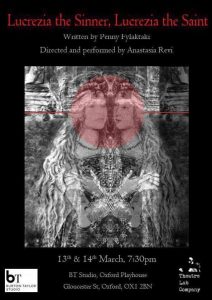LUCREZIA: SINNER AND SAINT (2018)

Staged at:
2019: Oxford Playhouse, Oxford, UK (dir.: Anastasia Revi)
Lucrezia Borgia has just died and gone to…well, one wouldn’t exactly call it Heaven, but an unidentifiable in-between place in afterlife. She stands waiting before a closed door, much to her surprise though, as she’s used to having all doors open for her in her earthly time. She calls out for God to welcome her in His Kingdom, but no one comes and no answer is given to her questions.
While trying to figure out the reasons behind such absence and lack of interest, she realizes that she has to make her ‘apologia’, in other words respond to her actions before God in the same way one makes an introduction for oneself among new acquaintances in a new environment.
Fully aware of the protocol of introductions, Lucrezia first gives a historically accurate account of her life, based only on facts and figures, titles and bloodlines, people and place names, dates and sociopolitical events.
The door won’t open.
A voice telling her always to pursue the truth makes Lucrezia change her account. A dramatic narration about her years of innocence violently interrupted by early marriages to serve political interests, her plunge into the sexual obsessions of her husbands, the Vatican orgies and the cold-blood assassinations unravel before our eyes. A disfigured baby –probably fruit of an incestuous relationship- is her first born child, with 7 more following by the time of her death, when she has long moved away from the Vatican and its deadly passions and found serenity by the side of her last husband in Ferrara and redemption in her occupation with Art and Letters.
Still the door won’t open.
Lucrezia becomes furious and changes yet one more time her life story moving from the victim’s to the victimizer’s viewpoint. She confesses how much she enjoyed going to extremes and stretching the boundaries of what’s acceptable, she admits to being a willing accomplice to all this and reverses any argument of Reason in a Socratic mode of conversation with God while reaching the point of hybris in a bold and audacious way.
Even now, the door remains closed.
Yet one more version of the same lifestory waits to be told. This time the narrator is neither a victim nor a victimizer, neither good or bad. And through it all, looking at things in retrospective or from high above, some subtle connections can be found, some strange patterns which shed new light to all the why’s and how’s, so that the final big question torturing her can be uttered: where do those who can see the whole of creation go?
And God – in his own, humorous way- answers.
